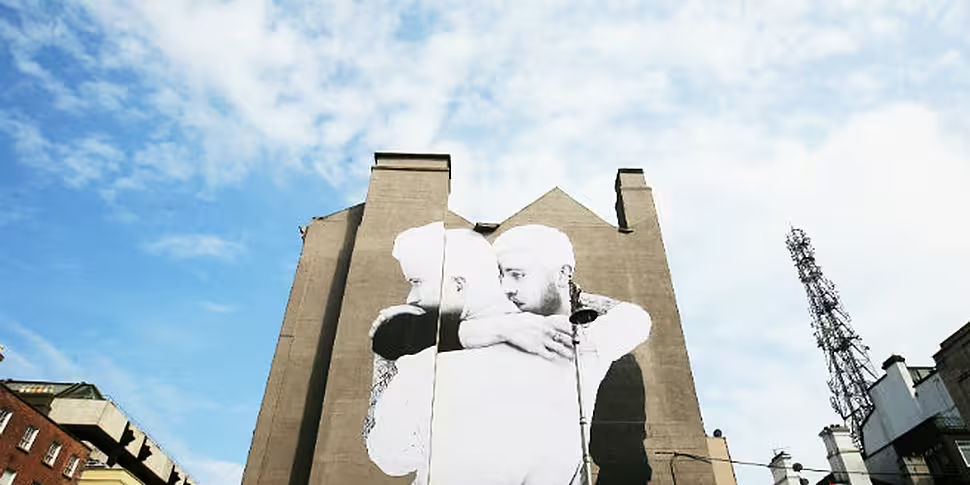Irish people are some of the most tolerant in the European Union, and they’re becoming more tolerant, according to a new EU survey published today.
Ireland is one the most open-minded societies in the EU on issues like who we will elect as president, and we're some of the most tolerant of LGBT people - but we're far more concerned than the average European about how things like accent and address can affect our employment chances.
The EU Fundamental Rights Agency report finds that Ireland’s attitudes on issues such as LGBT rights, ethnic minorities, older people and disabled people are generally more tolerant than EU averages, and similar to those in countries such as the Netherlands and Scandinavian countries.
Being above EU averages isn’t necessarily a sign of a tolerant utopia, however, with more than half of Irish people saying they feel ethnic discrimination is widespread in the country.
The report finds that some 58% of people believe discrimination based on ethnic origin is widespread in Ireland, while 49% of people believe discrimination based on sexuality is also widespread here.
Attitudes to ethnic minorities
In most categories Ireland was below the European average on levels of negative attitudes towards minority groups – with trends generally in-line with attitudes towards varying groups. Roma people were viewed most negatively on average, and this was the case in Ireland, where 12% of people said they would be uncomfortable working with a Roma person. The EU average was 20%.
Some 8% of people said they would be uncomfortable working with a transgender person, compared to an EU average of 17%.
Ireland was far above the EU average of people who felt comfortable working with a white person – with 94% saying they are, compared to an EU average of 83%.
The President
Ireland’s attitude to who we elect as President was pretty broad-minded on all accounts, with Ireland consistently polling at the top, or close to it, on attitudes to having a President from an ethnic minority (75%, up 12pp since 2013), and 81% - the highest in the EU – happy to have someone from a different religion in the highest elected office in the country.
In general we're happier to have a president who might be under 30, over 75, disabled, female, LGBT etc. than most EU nations. (See more specific figures below).
The impact of address and accent on your job prospects
One area in which Ireland was far higher than the EU average was in terms of the various factors that we feel can negatively affect someone when competing for a job.
A major potential disadvantage to Irish job seekers, we feel, is their address and accent.
Some 33% of all respondents believed a person’s address can negatively affect your chances of employment in Ireland, compared to an EU average of just 12%.
Accent is also seen as a potential block to employment, with 36% of Irish people thinking think your accent or manner of speaking can also be harmful, which is in line with the EU average.
When discriminated against, Europe goes to the police, Ireland not as much
One other area in which there was a clear discord between Irish attitudes and wider European views was in who they would turn to if discriminated against.
Although no rationale is offered for the reason for choosing different options (i.e. the findings don't suggest mistrust of the police or anything like that - they offer no reason), the report found that just 25% of people in Ireland said they would go to the police to report the incident, significantly lower than the 35% EU average.
This was in-line with a far higher likelihood in Ireland to report to equal opportunities organisations to report such issues, with 28% say they would go to an equal opportunities organisation, compared to EU average of 17%.
In terms of tackling discrimination, 69% believe Ireland should introduce new measures to raise the level of protection of groups at risk of discrimination.
Discrimination of minorities in the workplace remains
While attitudes may be more tolerant there have been previous studies that found there may be a discord with the reality for minorities in Irish society, with an ESRI report released in May of this year finding that “non-Irish nationals reported higher rates of discrimination both in looking for work and in the workplace than Irish nationals.”
That report found that Black African and non-White EU groups were “particularly vulnerable in the Irish labour market”.
The report was conducted in the first week of June this year, with face to face interviews of 1,004 people in Ireland, out of an EU wide total of 27,718.
The Specifics - Some of the other findings included in the report are
LGBT
Irish people have some of the most positive attitudes to LGBT people in the EU, close to countries like the Netherlands, Sweden and Denmark.
- 87% of Irish people agree that gay, lesbian and bisexual people should have the same rights as heterosexual people (EU average is 71%);
- 82% of Irish people agree that there is nothing wrong in a sexual relationship between two persons of the same sex compared to an EU average of 67%;
- 80% agree that same sex marriages should be allowed throughout Europe (EU average is 61%). This is up 39 percentage points on a September 2006 survey.
- Ethnic minorities
- When it comes to attitudes towards ethnic minorities, Irish people are open than the EU average.
- 78% of Irish people are at ease with the idea of their son or daughter having a relationship with a black person, above the EU average of 64%;
- 79% of Irish people are at ease with the idea of their son or daughter having a relationship with an Asian person, above the EU average of 69%;
- 59% of Irish people are at ease with the idea of their son or daughter having a relationship with a person from the Roma community, above the EU average of 45%.
The Presidency or equivalent
- Irish people are the most open-minded in the EU when it comes to who should fulfil the highest political office in the land, in Ireland's case the Presidency.
- Irish people (75% and up 19 pp since 2012 survey) are third most likely in the EU to be comfortable with the idea of having someone from an ethnic minority in the highest elected political position after Sweden (80%) and the UK (76%). The EU average is 55%.
- Irish people (64%) are the most comfortable in the EU with having a person aged over 75 in the elected as President (or equivalent). The EU average is 46%. On the other hand, 65% of Irish people are comfortable with having someone aged under 30 in the highest elected political position, also above the EU average of 54%.
- 81% of Irish people, highest in the EU, are comfortable with the idea of someone of a different religion from the majority of the population were appointed to the highest elected political position in their country. The EU average is 56%.
- 89% of Irish people, highest in the EU, are comfortable about having a person with disabilities in the highest elected position in the country, compared to an EU average of 69%.
- And we're also second highest at 94%, after Sweden at 96%, in being comfortable with having a woman in the highest elected position in their country. The EU average is 82%.
- 81% of Irish people are comfortable with the idea of a gay, lesbian or bisexual person being appointed to the highest elected political position in the country, 3rd highest in the EU after Sweden 87% and the Netherlands 85%. The EU average is 54%.
Working with people from other backgrounds
Irish people are also more comfortable having colleagues form ethnic minorities than the EU average:
- 93% of Irish people are comfortable to work with black colleagues, above the EU average of 83%;
- 91% of Irish people are comfortable to work with Asian colleagues, also above the EU average of 83%
- 77% of Irish people are comfortable to work with Roma colleagues, compared to an EU average of 63%.
- 95% of Irish people are comfortable with working with people over 60 (joint 4th highest in the EU) compared to an EU average 85%. Irish people (95%) are also among the most comfortable working with colleagues aged under 25 years. The EU average is 85%.
Relationships with people from other backgrounds
Irish people are also more at ease than the EU average with the idea of one of their sons or daughters being in a relationship with a person from a different ethnic background.
- 78% of Irish people are at ease with the idea of their son or daughter having a relationship with a black person, above the EU average of 64%;
- 79% of Irish people are at ease with the idea of their son or daughter having a relationship with an Asian black person, above the EU average of 69%;
- 59% of Irish people are at ease with the idea of their son or daughter having a relationship with a person from the Roma community, above the EU average of 45%. Irish people are also above the EU average in feeling comfortable with the idea of their sons or daughters being in a love relationship with a Jewish (77% versus EU average of 69%), Muslim (61% v. 50%), Buddhist (76% v. 65%) or atheist person (80% v. 76%).
- In general Irish people believe discrimination is less widespread than the EU average:
- 41% of Irish people believe discrimination on grounds of religion is widespread in Ireland compared to an EU average of 50%
- 40% of Irish people believe discrimination on grounds of disability is widespread in Ireland compared to an EU average of 50%
- 31% of Irish people believe discrimination on grounds of age (being over 55) is widespread in Ireland compared to an EU average of 42%









